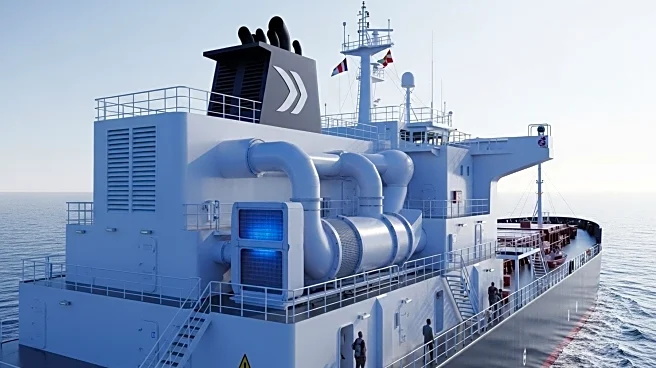What's Happening?
NSB Group, a German shipowner, has partnered with Phlair, a direct air capture (DAC) company, to address its Scope 3 emissions by capturing CO2 from the atmosphere and storing it underground. This initiative is part of NSB's broader strategy to cover its Scope 1 emissions using zero-emission technology. The partnership reflects a growing trend among shipping companies to invest in DAC as a decarbonization pathway. Other companies, such as NYK and Climeworks, are also purchasing carbon removal credits to offset emissions. DAC systems extract CO2 directly from the air, offering a scalable solution to reduce greenhouse gas emissions.
Why It's Important?
The partnership between NSB Group and Phlair highlights the shipping industry's commitment to reducing its carbon footprint. As international shipping emits roughly one billion tons of CO2 annually, DAC offers a promising solution to offset residual emissions that cannot be eliminated through operational improvements alone. This collaboration could pave the way for more widespread adoption of DAC technology, potentially transforming how industries approach carbon neutrality. The move also underscores the importance of innovative technologies in achieving global climate goals.
What's Next?
As DAC technology continues to develop, stakeholders will likely focus on scaling up its deployment to meet ambitious decarbonization targets. NSB's partnership with Phlair may encourage other shipping companies to explore similar initiatives. The success of DAC in the shipping industry could influence other sectors to adopt carbon removal technologies. However, challenges remain, including the energy requirements for DAC systems and the need for large-scale infrastructure to support widespread implementation.
Beyond the Headlines
The adoption of DAC technology raises ethical and environmental considerations, such as the potential for prolonging fossil fuel production. As DAC systems require significant energy inputs, stakeholders must ensure that the energy used is sourced sustainably. Additionally, the scalability of DAC will be crucial in determining its long-term viability as a decarbonization strategy. The partnership between NSB and Phlair may serve as a case study for balancing technological innovation with environmental responsibility.








